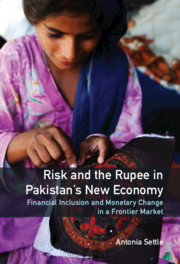 Risk and the Rupee in Pakistan's New Economy
Risk and the Rupee in Pakistan's New Economy Published online by Cambridge University Press: 31 March 2020
Money and monetary governance in Pakistan have radically transformed since partition. Through four distinct periods – the pre-liberalisation era that lasted up to the late 1980s, the years of liberalisation through the 1990s, the boom years of the early to mid-2000s, and the post-liberalisation period from 2008 onwards – the economy has shifted from a developmental state into an economy open to global markets. This radical restructuring of the economy has redefined the rupee.
Guided by the analytical framework outlined in Chapter 2, this chapter undertakes a brief history of the rupee that emphasises the development of instabilities and opacities under the liberalisation of money and markets. The chapter tracks the twists and turns of SBP policy to show how the hostile conditions surrounding the rupee in the 1990s – including the new inflationary dynamics of liberalised markets and the seemingly unmanageable threat to rupee stability in the lead-up and aftermath of its float in 2000 – were only relieved when the War on Terror prompted a repositioning of the economy in global markets. With abundant inflows and stable commodity prices in global markets, the SBP was able to accommodate the new patterns of payments that arose with liberalisation while protecting the rupee's value.
Yet beneath the benign macroeconomic conditions, two key issues remained unaddressed. One was informality, which was growing across the economy, and its monetary transactions, presenting an increasingly menacing threat to the capacity of the state to implement policy. The other was the liberalisation of key commodity prices, a process which the state appeared ultimately unwilling to carry out in respect of certain key prices. This led to a series of last-minute policy U-turns on the state's commitments to multilateral donors to let prices float.
Building on the analysis proffered in Chapter 2, this chapter presents these issues as issues of money and monetary management. Not only is informality a hindrance to monetary policy forecasting and transmission, but key commodity prices, such as those for wheat and electricity, are crucial to the stability of the monetary environment because they function as anchor prices. While never clearly spelled out as problems of economic governance, let alone as monetary issues, this chapter shows how the actions of the state with regard to both informality and commodity prices reveal their importance in maintaining stability in money and the economy at large.
To save this book to your Kindle, first ensure no-reply@cambridge.org is added to your Approved Personal Document E-mail List under your Personal Document Settings on the Manage Your Content and Devices page of your Amazon account. Then enter the ‘name’ part of your Kindle email address below. Find out more about saving to your Kindle.
Note you can select to save to either the @free.kindle.com or @kindle.com variations. ‘@free.kindle.com’ emails are free but can only be saved to your device when it is connected to wi-fi. ‘@kindle.com’ emails can be delivered even when you are not connected to wi-fi, but note that service fees apply.
Find out more about the Kindle Personal Document Service.
To save content items to your account, please confirm that you agree to abide by our usage policies. If this is the first time you use this feature, you will be asked to authorise Cambridge Core to connect with your account. Find out more about saving content to Dropbox.
To save content items to your account, please confirm that you agree to abide by our usage policies. If this is the first time you use this feature, you will be asked to authorise Cambridge Core to connect with your account. Find out more about saving content to Google Drive.